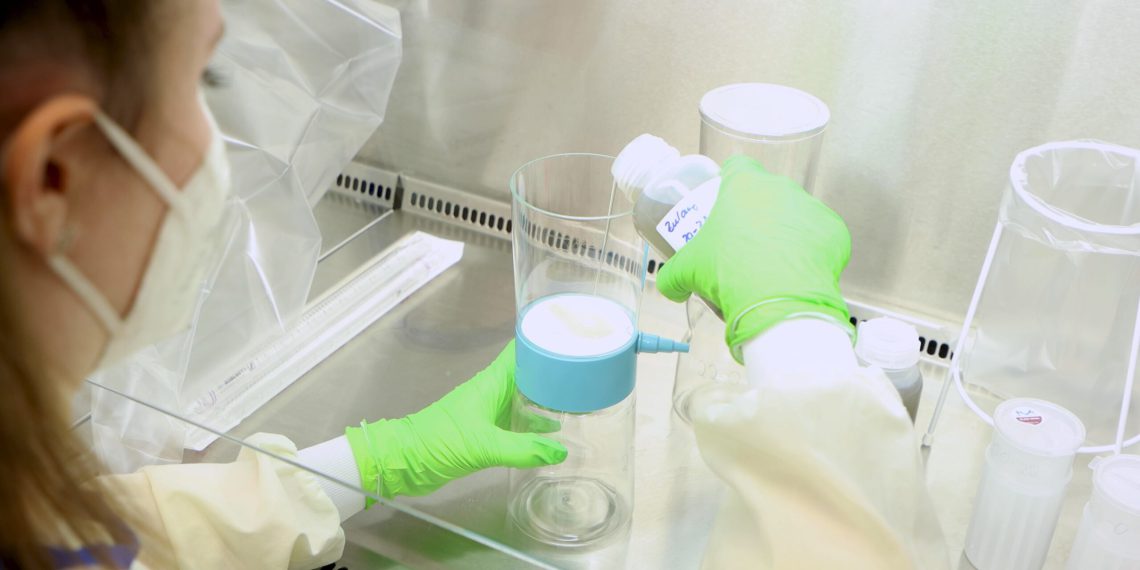In Berlin, as previously in Denmark, another subtype of the omicron variant is spreading: BA.2. This was revealed by the evaluation of wastewater samples at MDC in cooperation with Berliner Wasserbetriebe and the Berlin laboratory of the amedes group. BA.2 could prolong the current corona wave.
The coronavirus is constantly mutating. After Alpha and Beta came Delta, also Gamma, Lambda, Epsilon and Iota are circulating in parts of the world. Since Omikron came on the scene, Delta has almost completely disappeared in Germany. Two subtypes of omicron are known, BA.1 and BA.2. In Berlin, BA.1 has dominated until now. However, scientists from the Max Delbrück Center for Molecular Medicine in the Helmholtz Association (MDC), the Berliner Wasserbetriebe (BWB) and the laboratory company amedes have now been able to detect the omicron subtype BA.2 in Berlin wastewater: At the beginning of January, the proportion was barely visible, but by about January 13, BA.2 already accounted for six percent, and by January 20, about twelve percent. So it is growing rapidly.
The two subtypes differ from each other in about 20 mutations. In Denmark and South Africa, BA.2 has almost displaced the BA.1 subtype, and in the UK, the proportion of BA.2 has also been increasing rapidly since the beginning of January. A study by Danish researchers* shows that BA.2 appears to be spreading even faster than BA.1.
“It is possible that BA.2 is somewhat prolonging the current omicron wave. But the data from the U.K. and Denmark so far tend to suggest that in terms of disease severity and vaccine effect, BA.1 and BA.2 are comparable.”
- Dr. Emanuel Wyler, molecular biologist
Computer tool predicts whether incidence will increase or decrease
In making their prediction, the scientists* rely on a computer-based tool developed by Vic-Fabienne Schumann and Dr. Rafael Cuadrat of Dr. Altuna Akalin’s Bioinformatics and Omics Data Science technology platform at the Berlin Institute of Medical Systems Biology (BIMSB) together with colleagues. With “PiGx SARS-CoV‑2” they can detect the spread of SARS-CoV‑2 as well as the frequency of mutations or virus variants. It works independently of the number of coronatests and disease progression.
Their results are consistent with those of Berliner Wasserbetriebe, which has developed its own detection model, including sequencing of the virus variants, and an app for visualizing the data in cooperation with the Berlin laboratory of the amedes group, led by Dr. Martin Meixner. The center and Berliner Wasserbetriebe share the work: While the focus of the Wasserbetriebe is on the rapid determination and transmission of the viral load, the MDC primarily analyzes subtypes and mutations.
For more than a year, the researchers have been searching for the genetic material of the coronavirus in Berlin’s wastewater. Once a week, Berliner Wasserbetriebe, which is currently setting up its own virus sequencing facility in its laboratory, prepares wastewater samples and sends them to BIMSB and amedes. The scientists enrich the virus particles and amplify the virus genome using PCR. In a next step, they can use high-throughput sequencing to see what proportion of the individual virus variants make up among the coronaviruses found. The wastewater sequencing at BIMSB is the responsibility of Markus Landthaler’s research group in particular, as well as the genomics platform headed by Dr. Janine Altmüller.
Up to now, when samples from the throat are sequenced, no distinction is made between virus variants. Wastewater analyses make this easier:
“For a meaningful result on the spread of new virus variants, significantly fewer samples need to be examined than in the analysis of nasopharyngeal swabs. They can also serve as an early warning, as they show which variant is circulating with a few days’ lead. The data on BA.2 show how sensitive and efficient wastewater monitoring is in determining pathogens. This is also important beyond SARS-CoV‑2.”
- Markus Landthaler
Investigations of wastewater have not yet been established in Germany as part of a corona early warning system — neither for known nor for completely new virus variants. That could now change: Berlin is one of 20 pilot sites in the wastewater monitoring program, which the German Federal Ministries for the Environment, Nature Conservation and Nuclear Safety (BMU), for Health (BMG) and for Education and Research (BMBF) are funding with the help of EU funds. The project partners are Berliner Wasserbetriebe and the State Office for Health and Social Affairs. The goal is a national wastewater monitoring system. It is to collect data on SARS-CoV‑2 and, in particular, its variants in wastewater and transmit them to the responsible health authorities and to a European exchange platform.

















